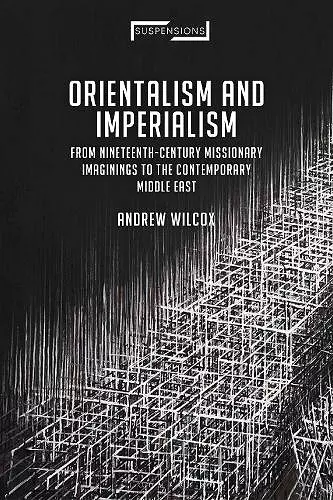Orientalism and Imperialism
From Nineteenth-Century Missionary Imaginings to the Contemporary Middle East
Format:Paperback
Publisher:Bloomsbury Publishing PLC
Published:23rd Jan '20
Currently unavailable, and unfortunately no date known when it will be back

Through a case study of the Kurdish region, this book questions the relationship between Orientalist expression and imperial power, applying it to contemporary global concerns about neo-liberal cultural imperialism.
Using the work of Edward Said as a point of departure, this book dissects the concept of Orientalism through the lens of 19th century missionary impressions of Kurdistan. Wilcox argues that dominant interpretations of Said's work have a tendency to present Orientalism as an essentialist practice and instead offers an alternative manifestation in which the Oriental is perceived as the mutable product of cultural forces.
The relationship between missionaries and imperialism has long been a contentious issue with many scholars highlighting their apparent ambiguity. This study reveals how Protestant missionaries can be identified as anti-imperialist in their rhetoric of ecumenical independence; yet through their preconceptions of Oriental inferiority, they contributed to a more subtle undermining of local forms of knowledge and identity. Wilcox argues that this apparent ambiguity is in part a consequence of the ways in which the term imperialism is frequently used to allude to diverse and even contradictory meanings; therefore it is not so much the missionaries who are ambiguous, as the ways in which they are judged by today’s multivalent standards. The analysis also makes clear the complex discursive processes which can undermine the actions of altruistic individuals.
By drawing threads from this 19th century example into the current geopolitical foreground of Middle East-West relations, this book not only sheds light upon a little-known historical case study but also illuminates larger questions of the present and future encouraging a more vigorous examination of contemporary Orientalist prejudices.
Andrew Wilcox helps unravel otherly Orientalist stereotypes through the lens of otherwise obscure, conflictual 19th century Anglican and American Presbyterian missionary impressions of Kurdistan. In giving us a new interpretation of the intricate treasure-throve of interrelationships among deterministic Orientalists, disputing missionaries, and ambiguous imperialists, Wilcox enables us better to understand today’s varying standards of judgement as well as decipher the complicated discursive processes which undermine actions of otherwise altruistic actors. -- Michael M. Gunter, Professor of Political Science, Tennessee Technological University, USA
Andrew Wilcox’s book addresses two important issues: the question precisely how missionaries were connected to the modern European imperialist enterprise; and the related, but so far imperfectly studied matter of their place in Said’s theory of Orientalism. The book provides methodologically sophisticated perspectives on both that will excite specialist and educated readers alike. -- Geoffrey Nash, Senior Lecturer in Literature, University of Sunderland, UK
In this richly researched cultural history, Andrew Wilcox refines our understanding of the contours of Orientalism, revealing orders of distinction, complexity, and even contradiction that can’t but sharpen our analysis of empire’s variegated past and ongoing present. -- Keith P. Feldman, Associate Professor, Department of Ethnic Studies, University of California, Berkeley, USA
ISBN: 9781350146525
Dimensions: 232mm x 154mm x 18mm
Weight: 1380g
248 pages